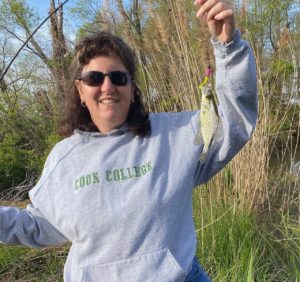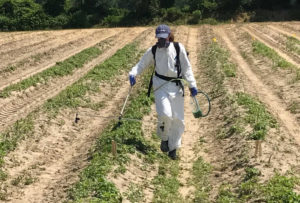Ask the Ag Agent was created when COVID-19 forced a new normal in communications nationwide. Rutgers Cooperative Extension Agricultural Agents working with “Ask the Ag Agent” education and outreach are c ommitted to the agriculture industry and all interested in growing plants, raising livestock and essential resources related to agriculture. The program now features a new Ask the Ag Agent website with more information.
ommitted to the agriculture industry and all interested in growing plants, raising livestock and essential resources related to agriculture. The program now features a new Ask the Ag Agent website with more information.
Farmers and others are welcome to join a weekly teleconference each Wednesday night from 7:00pm-8:00pm. Weekly events are hosted by Rutgers Cooperative Extension Agricultural Agents working with the farming industry.
This call-in/WebEx event features updates on farm management, crop conditions, farm industry observations, agricultural agency programs and other topics discussed by farmers, agricultural agents and other agricultural service providers.
Hosted by Bill Bamka, Stephen Komar, Michelle Infante-Casella and Meredith Melendez, this weekly communication provides a forum for discussion for farmers and all involved in NJ agriculture. Agricultural agency personnel, non-profit organizations and others have participated and added additional discussion with farmers.
This event and other events hosted by Rutgers Cooperative Extension can be found on the Rutgers NJAES Events website.
To join the “Ask the Ag Agent” forum each week on a computer/tablet/smartphone via the WebEx Videoconference:
Use the URL: https://go.rutgers.edu/rc9n3kxt
To join the “Ask the Ag Agent” each week on the Phone:
Call: (650)-429-3300
Access Code: 799-743-872 # followed by #

 ertain time together.
ertain time together. Paraquat is an herbicide labeled on various crops species for row middles applications. However, with new paraquat use restrictions in place, vegetable growers may be interested by other herbicide options available for controlling emerged weed seedlings. Paraquat controls numerous annual grasses and broadleaf weeds seedlings by inhibiting plant photosynthesis. Its acts quickly by contact when absorbed by plant foliage and has no soil activity due to complete soil adsorption. Because of poor translocation, it is essential to have complete foliar coverage to achieve good weed control. Hence, the need for a non-ionic surfactant and the importance of making sure that weeds are not taller than 6” when direct-spraying paraquat in row middles. Paraquat offers relatively good crop safety because it does not translocate and will control a wide range of annual weeds at the seedling stage, which makes it the herbicide of choice for postemergence row middles weed control in labeled crops.
Paraquat is an herbicide labeled on various crops species for row middles applications. However, with new paraquat use restrictions in place, vegetable growers may be interested by other herbicide options available for controlling emerged weed seedlings. Paraquat controls numerous annual grasses and broadleaf weeds seedlings by inhibiting plant photosynthesis. Its acts quickly by contact when absorbed by plant foliage and has no soil activity due to complete soil adsorption. Because of poor translocation, it is essential to have complete foliar coverage to achieve good weed control. Hence, the need for a non-ionic surfactant and the importance of making sure that weeds are not taller than 6” when direct-spraying paraquat in row middles. Paraquat offers relatively good crop safety because it does not translocate and will control a wide range of annual weeds at the seedling stage, which makes it the herbicide of choice for postemergence row middles weed control in labeled crops.